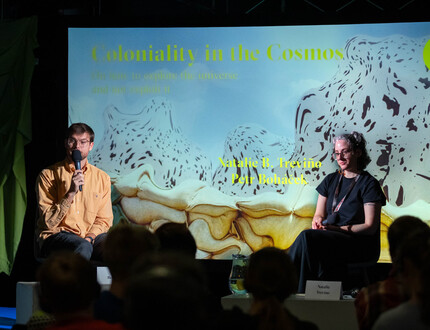Often referred to as the final frontier, outer space occupies a strange place in the Western imagination. It functions as both a bastion of the unknown and as a source for hope. Yet, the Western-centric direct engagement with space exploration often reduces space to nothing more than a source for raw materials to finance private companies for the gain of their stockholders. Governments and private companies seek to understand and know what is out there not for some altruistic purpose as the rhetoric might claim—i.e. Planet B, for the benefit of all humankind, inspiration—but for utilitarian value and how the universe might be exploited. There is an entire economy of speculation on the commercial value of asteroids, minerals, or other cosmic bodies, while research into how to have thriving multi-faceted communities in space is lacking. Elon Musk says his Starship will carry 100 people to Mars? Who will those people be and how will they live together on that ship once they reach the planet? Why has this idea been used to gain investors and finances but so little work has been done on the actual social arrangements? This shows the priorities not necessarily of those interested in space exploration, but of those who seek to use space for profit-making. What this appears to mean then is that space exploration is more about benefiting some people while promising that the universe is for all. Rather than following the major space powers and billionaires, envisioning a future in space that encompasses the vast diversity of our planet is essential for a better world.
We see that the values and activities of the exploration of space have come to be predominantly unjust and harmful. From the appropriation of indigenous land to build launch sites and telescopes to the unequal access to and use of low earth orbit, the benefits of space have not been for “all humankind” as the Outer Space Treaty proclaimed. The rules of who gets to benefit from space are just as elitist and privileged as ever. How can all people be part of space exploration without reproducing Earthly injustice?
In 1973, Sun Ra, the visionary Jazz musician, exclaimed that Space is the Place! And I think many of us would agree. Space is both a very real material place and one in which each human gets to imagine it. While outer space has been a source of inspiration for everything from new technologies to social justice and political actions, what it is not, currently, is a place for all peoples. Can space exploration be more of a celebration of life and liberation? I think it can. This begins as many things do—with imagination, inspiration, and community. Space holds dreams of better things, new places, new forms of being and knowing the universe. Looking up at the sky is a human trait. Linking our cultures and ways of life to the sky is something that all cultures, past and present, do. Space isn’t just out there—it is a part of our histories, our cultures, and our daily lives.
Over the course of the 20th century, the exploration of space went from being a fantasy to a reality through the work of scientists, engineers, politicians, writers, thinkers, and dreamers. Different nations, cultures, and peoples had and have very different reasons for exploring space, but this is not reflected in the access and use of space. Every single person on this beautiful planet Earth has a relationship to space, yet only certain types of ideas and visions are popularized. How many peoples from the peripheries see themselves represented in space activities or even in the visions of the future? While there is no clear answer to this and many other questions, what I think is essential is dreaming about space. We must not let our dreams be influenced by other people’s desire for power or profit. There are so many dimensions to think through when it comes to space exploration. We must encourage all imaginations to seek and explore all the possibilities of space. Space is the place, but it is not the final frontier.


